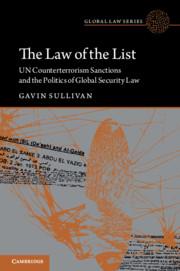Book contents
- The Law of the List
- GLOBAL LAW SERIES
- The Law of the List
- Copyright page
- Dedication
- Contents
- Figures
- Foreword
- Acknowledgements
- Table of Cases
- Abbreviations
- Interviews
- 1 The Law of the List
- 2 Global Listing Technologies and the Politics of Expertise
- 3 The List As Multiple Object: the UN Office of the Ombudsperson
- 4 Complexity in the Courts: the Spatiotemporal Dynamics of the List
- 5 Conclusions
- Bibliography
- Index
5 - Conclusions
Published online by Cambridge University Press: 24 April 2020
- The Law of the List
- GLOBAL LAW SERIES
- The Law of the List
- Copyright page
- Dedication
- Contents
- Figures
- Foreword
- Acknowledgements
- Table of Cases
- Abbreviations
- Interviews
- 1 The Law of the List
- 2 Global Listing Technologies and the Politics of Expertise
- 3 The List As Multiple Object: the UN Office of the Ombudsperson
- 4 Complexity in the Courts: the Spatiotemporal Dynamics of the List
- 5 Conclusions
- Bibliography
- Index
Summary
This concluding chapter draws The Law of the List together and is structured in three parts. First, the key arguments of the book are reiterated by providing a brief summary of each chapter. Second, six original contributions the book brings to the study of global security law and governance are highlighted. These include: (i) studying global law empirically as an assemblage of relations and practices, (ii) studying ‘the global’ through local structure-making sites rather than from international institutions (like the Security Council), (iii) mapping the politics of expertise in global law-making, (iv) studying technologies of governance as devices that assemble legal and political relations and that have performative effects, (v) analysing how preemptive security produces novel rearrangements of law and governance that require empirical study, and (vi) rethinking global emergency governance as something assembled from mundane practices, rather than an effect of sovereign power. The chapter closes by arguing that the Law of the List, first introduced as a temporary preventive measure by the Security Council, is now a permanent feature of the global security law landscape. This book is an experiment in strategic knowledge production and an invitation for further socio-legal studies of global security law to come.
Keywords
- Type
- Chapter
- Information
- The Law of the ListUN Counterterrorism Sanctions and the Politics of Global Security Law, pp. 305 - 331Publisher: Cambridge University PressPrint publication year: 2020

